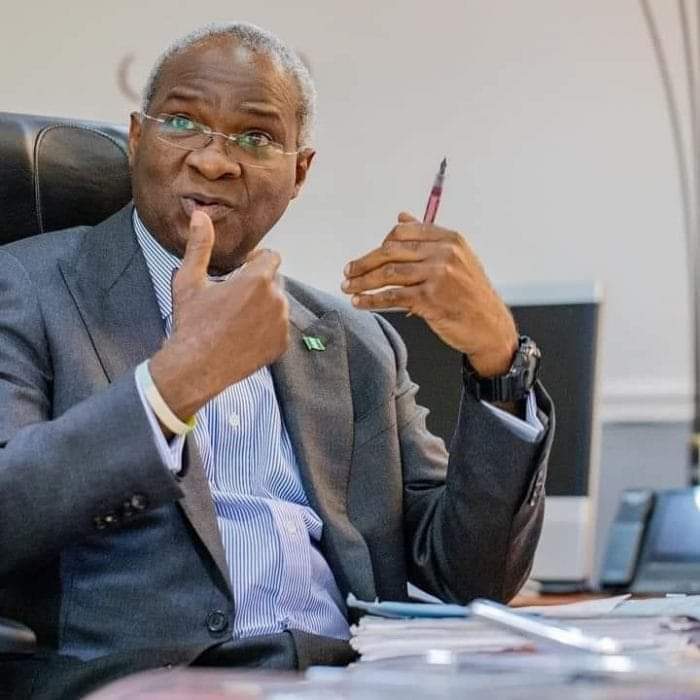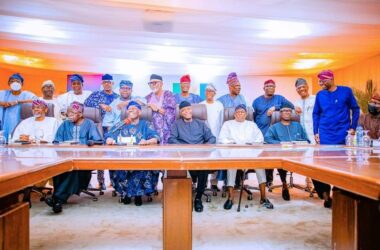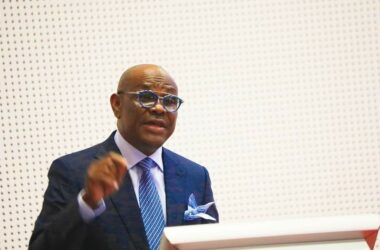By his own account, he never wanted nor expected to be in government – or work FOR government in ANY capacity – in his life. But, in an irony of fate, the very reasons Babatunde Raji Fashola, CON, SAN, used to give, during his coming-of-age years, for his aversion to government work are the exact same reasons he is recognized today, across Nigeria and beyond, for his track record in government. According to him, his early encounters with official bureaucracy – first as a prospective youth corps member posted to a government ministry, then as a lawyer who was expected to interface with officialdom now and then in the course in his career – put him off, thanks to what he saw as the sheer inefficiency of government agencies, the seeming lethargy (or, at best, suspended animation) of most public servants, the often anachronistic rules, regulations and traditions that governed the operations of Ministries, Departments and Agencies (MDAs) of government, and the mind-deadening tedium of day-to-day activity in a typical government office.
No, thank you, Fashola said was his usual response in those days to any suggestion, no matter how well-meant, that he might consider working with – on in – government. His private law practice, which had, meanwhile, propelled him to the prestigious rank of a Senior Advocate of Nigeria (SAN), was, on the other hand, a challenging, adrenaline-fueled, and sometimes cut-throat adventure on both the intellectual and social levels. It suited his go-go, result-oriented temperament and his tendency to measure his performance and that of his colleagues not in terms of effort or time spent, but in terms of KPIs in respect of set targets, timelines and verifiable benchmarks.
‘What does Government even do, sef?’ he remembers asking no one in particular on more than a few occasions.
It was not until he was tapped by the then-Governor of Lagos State (and now President of Nigeria), Asiwaju Bola Ahmed Tinubu, to be his Chief of Staff in 2002, that Fashola finally had to face up to and confront his aversion for officialdom. Upon assuming office as COS to the then-Governor, he answered his own question:
‘What does Government do? Plenty. Governnment does a lot of things.’
The things government does, he came to understand, exert a disproportionate impact on every aspect of our lives as citizens, and a powerful influence on many of the decisions we make. Whether government does these things well or badly, he now admitted, depended on the quality of leadership and the competence and dedication of its personnel at every level of the administrative value chain.
As COS to the Governor of Lagos State, he decided he was going to provide that leadership, and demonstate that competence. Having now seen the overarching role of government (and in particular the public service) in shaping the lives and livelihoods of the people, Fashola became an ardent advocate of an efficient, effective and timely bureaucracy, especially as it concerned the work of his principal and his ability to deliver on gis campaign promises. At first, he says, even Gov. Tinubu was bemused by his zeal and pace of work, and on more than one occasion had to caution his COS on the dangers of over-reach. To which Fashola would respond that he would rather take a bad decision, and face the consequence, than not take any decision at all.
In time, though, the Governor, already relishing his reputation as a perceptive head-hunter with an eye for top talent, knew that he had scored yet another bulls-eye in his learned aide. Rather than see Fashola as an uppity, overzealous upstart, Tinubu, by 2006, began to see in the Senior Advocate the makings of a worthy successor in the Governor’s mansion in Alausa, come May 29, 2007.
The rest, as they say, is history.
Reflecting on Fashola’s gubernatorial tenure, the influential international business magazine, The Economist, in its widely-acclaimed article, ‘A Rare Good Man,’ remarked on the fact that Fashola was not your run-of-the-mill Nigerian career politician whose sole preoccupation seems to be the acquisition of power (or the positioning of oneself and one’s cronies for political advantage), as an end in itself, at the expense of embarking on the nitty-gritty of governance with the aim of advancing the public good. Fashola, the publication noted, did so well in transforming the fortunes of Lagos State in his 8 years at the helm precisely because of his distrust of the ways of government based on politics as usual.
It also noted that Fashola was such a high performer as Governor of Nigeria’s richest and most challenging state because he wore the authority of his high office so lightly. He had not really sought the office in the usual way of politicians. In fact, with his boss about to relinquish power in 2007, Fashola was also already giving his old law office a going-over, and keeping his partners on the lookout, in preparation for his return to private legal practice. But beyond his quite understandable shock at being chosen as Governor (or more accurately, as the gubernatorial candidate of the then-ruling Action Congress of Nigeria, ACN), Fashola clearly understood Tinubu’s action in preferring him to the procession of experienced political titans who had lined up to take over from the Asiwaju ahead of the ACN primaries. Fashola understood his being chosen as a call to duty and a rendezvous with destiny. He knew that the outgoing Governor was entrusting the sustenance of his innovative initiatives to him, given the fact that he had, as COS, been instrumental in conceptualizing most of them. The concept of government as a continuum would enjoy its full expression in the transition to a new administration in 2007. Under a Fashola, Tinibu’s legacy projects would not be abandoned.
And so it turned out to be. The Fashola government carried forward the promise of the Tinubu years in a multiplicity of sectors – from infrastructural regeneration; to mass transportation (notably with the inauguration of the Bus Rapid Transit, BRT, system); to the suburban rail system; to highways and footbridges; to education; to rural transformation; to the reclamation of land from the sea (whose crowning glory, of course, is the rise of Banana Island and Eko Atlantic City); to city beautification; to public security; to water safety, to public health (most notably the fight against the deadly Ebola virus, in which the Governor displayed exemplary, hands-on leadership).
This pattern of high performance continued at the end of his stewardship as Governor, when he was appointed by the new President of Nigeria, Muhammadu Buhari, GCFR, as Minister for Works, Power and Housing (a triple-barelled job description that, rather than weigh him down and sap his mental energies, simply confirmed his mettle and, in the eyes of not a few people, his pedigree as presidential material).
With the imminent expiration of the Buhari Administration in 2023 and the commencement of the race for his successor, not a few observers of the political terrain had expected Fashola to, at least tentatively, show his interest in the highest office in the land. But he hung back interminably – even after some of his colleagues from the Tinubu era in Lagos (notably Buhari’s vice-president, Prof. Yemi Osinbajo, had done so). Apparently, he was waiting for his former boss, Asiwaju Tinubu, to show his hand. He was giving his political benefactor the so-called right of first refusal. This refusal to grab at power, no matter what, is as much a character of the man as his refusal to be content to let problems demanding prompt solutions fester without challenging them.
Much has been said about his fierce and unflinching loyalty to Asiwaju Tinubu (even though the two men have been known to have their differences at various times) and the passion with which he jumps to Tinubu’s defence whenever the latter comes under attack from any quarter. Much has also been said, now that Asiwaju Tinubu is Nigerian President and has since named his cabinet, about Fashola’s conspicuous absence from said cabinet. A number of stakeholders within and outside the government – including elder statesmen – had expected the former Lagos Governor to be tapped as Tinubu’s Chief of Staff (in a replication of the role he had played so well at state level at the outset of his career in government). Others had speculated that he might be named Attorney-General and Minister of Justice, or Minister of Foreign Affairs. But now that those roles have gone to Femi Gbajabiamila, Prince Lateef Fagbemi, SAN, and Ambassador Yusuff Tuggar, respectively, the speculations have died a natural death.
So what now for Nigeria’s poster-boy for good governance? Is this the end of a glittering political career? Not many think that is likely. But for the 60-year old, it might not be such a bad thing. Government may be a continuum, but the dramatis personae need not be. Public service, to him, need not come with the panoply and pageantry of office. In a recent interview, he demonstrated why he is seen by his teeming admirers as more of a statesman (who thinks about the next generation) than a mere politician (who only thinks of the next election). There is a need, he asserted, to bring more outstanding public-spirited people – including young people – to occupy spaces as they evolve. ”If some do not move on, where is the place for the next batch?” Of himself, he added, “I do not need a title to serve … All of us must play our roles as citizens, and a citizen does not need a title to serve. The biggest title you need is that of a citizen. “
True. But at a time when Nigeria is undergoing one of the most challenging times in its chequered history, the spectre of a figure such as a Babatunde Raji Fashola, SAN, OON, riding off into the proverbial sunset would be nothing short of tragic. After all, at only 60 years of age, he is still in the prime of life, politically speaking, and at the peak of his mental powers. Far from being an ordinary citizen, he has shown himself to be what the ancient Greek thinkers loved to refer to as a ‘‘philosopher-king‘ ie a leader who combines profundity of thought and decisiveness of action in equal measure. In the course of over a decade and a half of legal practice, four years as the astute aide to the man who today presides over the fortunes of Africa’s most populous country, and eight years at the helm of a city-state reputed to be Africa’s 5th largest economy, during which time he unleashed its enormous potential on one hand, and tamed its unruly and lawness ways on the other, Babatunde Raji Fashola is the epitome of the kind of leader societies from the dawn of time have sought out – whether in an executive or advisory capacity.
In fact, it was none other than the aforementioned Economist magazine – normally restrained in its editorial style, and sceptical in its analysis of political events and policymakers – that all but declared Babatunde Fashola the ‘next’ President of Nigeria, to take over from then-President Goodluck Jonathan – writing that he was ‘destined‘ for the role of Commander in Chief by virtue of his star turn in the country’s commercial capital.
Nigeria, of course, doesn’t work that way, but this positive view from abroad, from a prominent member of the Western media community which tends to feed on, and reinforce, negative stereotypes about Africa (and its leaders) is particularly instructive.
Not bad for a man who, in his earlier days, did not even want to work in government in the first place. Not bad at all.






